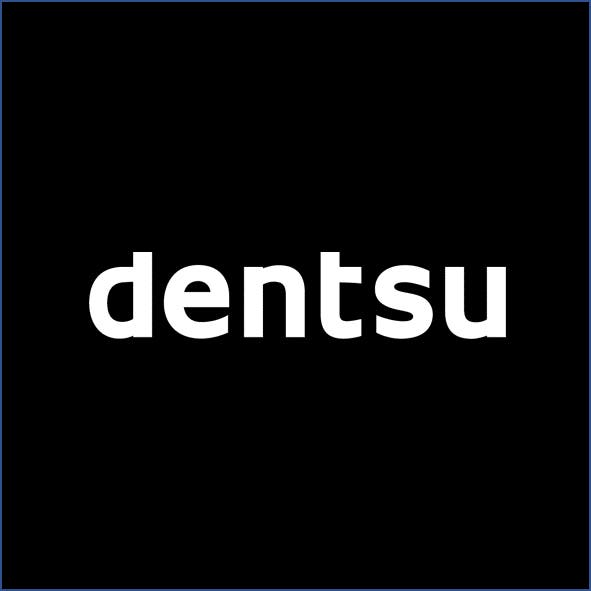Written by Alex Wright, Managing Partner, SEO, dentsu Digital
Google I/O 2025: Introducing SEO’s AI Era

Source: https://blog.google/technology/ai/io-2025-keynote/
AI isn’t new in the world of SEO. We’ve seen several developments and enhancements in AI technology over the last 18 to 24 months.
But 2025’s Google I/O felt different.
Over the two days, we heard from various product owners and stakeholders at Google as they introduced the products that they’re working on, powered by AI, that will change the face of search and wider applications as we know them.
From a complete reimagining of search to improvements in Gemini models and new technology, several updates have been introduced that will redefine the way search marketers approach strategies in the coming months.
The updates
The biggest update from the conference (and one that spilled over to many other facets) was the introduction of AI Mode.
AI Mode completely changes the face of search, showing Google leaning heavily into the experiences that users have become familiar with through popular large language models (LLMs), such as ChatGPT, Claude, and CoPilot.
AI Mode
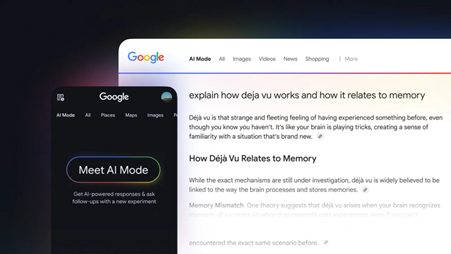
Source: https://blog.google/products/search/ai-mode-search/
Query fan out and follow-ups
When a user enters a search query or prompt, AI mode performs multiple queries simultaneously. The results returned to these queries are then summarised by Gemini and delivered to the user with relevant links.
Users can also ask follow-up queries, and AI mode will retain context from previous prompts.
Personal context
Users can opt in to personal context, which will allow AI mode to access your information across Google products to generate more personalised results (coming in July).
Ads
Ads will be available in AI Mode (and AI Overviews) on desktop, with rollout to all devices scheduled for later in the year. We’ll be given query data for this in Google Ads.
A new shopping experience
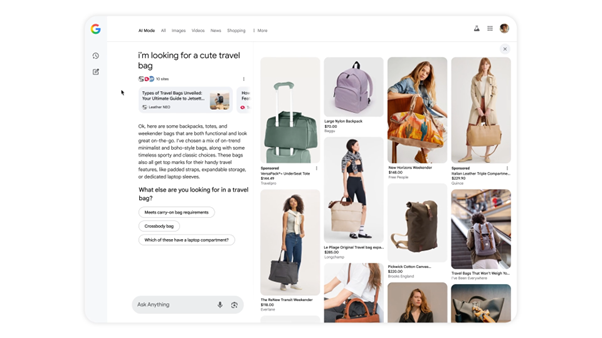
Source: https://blog.google/products/shopping/google-shopping-ai-mode-virtual-try-on-update/
AI Mode features a shopping experience powered by Gemini.
Shopping graph
The experience is powered by Google’s Shopping Graph, which powers the current shopping experience.
Check out in AI Mode
Although unconfirmed, Merchant Centre Next may allow users to check out directly in AI Mode. This feature already exists in Shopping.
Local search in AI Mode
Local queries generate a summary of locations suitable for AI Mode queries. These summaries appear to be generated by third-party sites, such as Yelp. A carousel also appears below the summarised results, which seem to be powered by Google Business Profiles.
AI Overviews are driving a 10% increase in usage
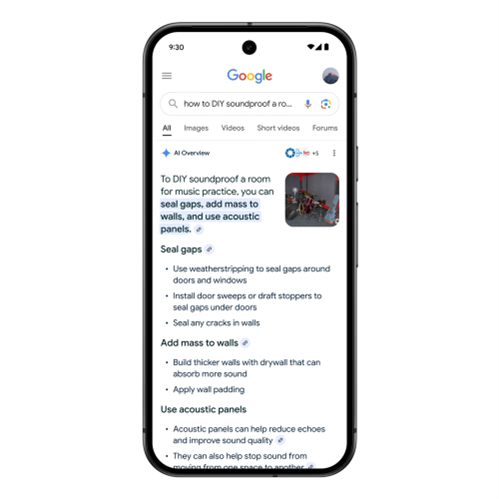
Source: https://blog.google/products/search/ai-overview-expansion-may-2025-update/
Google have reported an over 10% increase in usage of Google for the types of queries that show AI Overviews, and they’re now available across multiple countries and languages. Support has been added for Arabic, Chinese, Malay, Urdu, and more.
Gemini 2.5 has also been integrated into AIOs in the US to tackle even more challenging questions.
Agentic purchasing
Google’s AI agent (powered by Project Mariner) will allow you to define criteria which will instruct it on when to purchase a product for you (for example, when the price of an item falls below a certain benchmark). All purchases will be made using Google Pay.
Virtual try-on
Virtual try-on will allow users to see how a piece of clothing may fit them by uploading an image of themselves. These looks can be saved for later or shared with others. The experience is currently available in Labs in the US.
Live searching & problem solving using your camera
Using Gemini, users can have real-time conversations using their smartphone camera. Users will be able to select the ‘LIVE’ feature in AI Mode. After pointing the camera at an object, they can ask questions, and Search Live will respond in real-time with relevant explanations, videos, and links to websites.
Google has also confirmed that they are working on smart glasses, aiming to compete with the Meta/Ray-Ban product, which allows users to search via their glasses.
Further development of Google Gemini
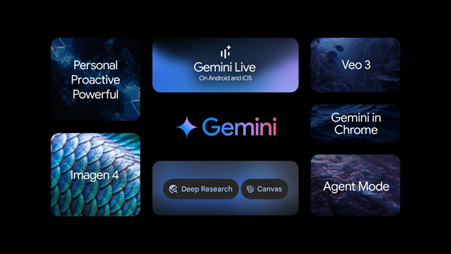
Source: https://blog.google/products/gemini/gemini-app-updates-io-2025/
Google is supercharging Gemini – they have introduced new models as well as multiple new ways they’re advancing other technologies using AI.
- AI Mode & AIO: Gemini 2.5 will be used for both AI Mode and AI Overviews. This model outperforms its competitors’ capabilities.
- Deep Think: Deep Think is a highly advanced reasoning model integrated into Gemini 2.5 Pro and 2.5 Flash, enabling users to generate reports by combining public data with their own private PDFs and images.
- Computer use: Project Mariner’s computer use capability will be made available through the Gemini API and Vertex AI, allowing developers easy access to agentic capabilities.
- Thought summaries: 2.5 Pro and Flash will now include thought summaries in the Gemini API & Vertex AI. The model’s raw thoughts will be organised and formatted to provide key insight into model actions.
- MCP support: Native SDK support is now available for MCP definitions in the Gemini API. This will make it much easier to build agentic applications through Gemini.
- Gemini Diffusion: This new, state-of-the-art model generates outputs by converting random noise into coherent text or code.
What does this mean for SEO?
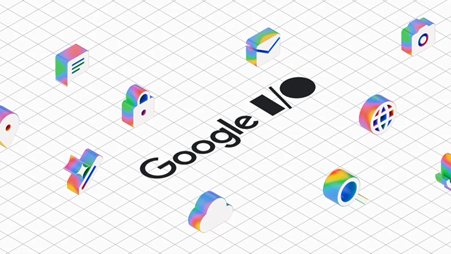
Source: https://blog.google/technology/ai/google-io-2025-quiz/
It’s safe to say that there’s a lot to unpack following the developments at Google I/O. For our team, the updates provoked thoughts surrounding:
- Measurement
- Feed & structured data importance
- Content & creative
- Brand & audience
Measurement
Based on the updates from I/O and the conversations currently happening within the SEO space, it’s clear that measurement will be a challenge in the future.
While AI Overviews have been challenging to track due to a lack of segmentation, we’re seeing early signs that AI Mode sends no information to platforms such as Google Search Console.
Visibility tracking will also be a consideration with the advent of Personal Context in AI Mode. Highly personalised results will render traditional rank tracking redundant.
We’re still waiting for the dust to settle on measurement and tooling, but some elements are already clear:
- KPIs must evolve: In a world where clicks are harder to attract and track, we need to reframe our expectations of user behaviour and focus on metrics that allow us to track this more effectively.
- Testing is key: Brand lift studies and randomised controlled testing will become commonplace in strategies. Understanding that X activity leads to Y outcomes will help to drive business performance in a more obscure landscape.
The importance of feed & structured data
One of the most encouraging realisations was that feed management will provide a significant amount of control over brand visibility in AI Mode. This applies to:
- Shopping feeds: Feeds contribute directly to the Shopping Graph, which in turn powers the shopping experience in AI Mode. We have a large amount of control over the information in feeds and should take full advantage of this.
- Video Manager in Merchant Centre: At Google Marketing Live, Google announced the integration of Video Manager with Merchant Centre. We can assume that this will also be fed into the shopping graph and should be considered as part of a creative approach.
- Local Business feeds: Whilst this went slightly under the radar at I/O, it’s clear that we’ll also have an increased amount of control over local SEO performance. Google Business Profiles feature heavily in local search queries in AI Mode, which means we’ll have some power here also.
It also appears that citations from trusted directories, such as Yelp and Yell, are being heavily featured in local results for AI Mode. Solutions like Yext can help manage these listings at scale.
Content & creative
Google actively collates content from various websites and summarises it using Gemini, raising a question about how businesses should approach content. This week, Google released guidelines on helping your content to appear in AI experiences, and the message has broadly remained the same: create “content that fulfils people's needs. Focus on making unique, non-commodity content that visitors from Search and your readers will find helpful and satisfying.”
The reality is, we’re going to have to work harder to stand out with content, and the way to do that is to:
- Closely align content with audience and user intent
- Anticipate follow-up questions and adapt content to answer
The goal of content and creative should be to make it memorable and establish or strengthen relationships with audiences. We may not receive clicks from this activity anywhere. Still, we must be aware of the influence and improvement in brand affinity that powerful, creative and helpful content can have on users.
Brand & audience
As we transition to a highly personalised landscape where measurement is complex and content is being curated and summarised for users, the importance of brand and forging bonds with audiences cannot be overstated.
Being a brand that users actively seek out and return to time and again is the goal for any business; therefore, this shouldn’t be new to many disciplines. However, we should now be considering how SEO can contribute more to this goal:
- How does our website content align not only with our users but also with our broader channels?
- How can PR drive searches for our brand and product or service type queries?
Furthermore, how can we use the above to:
- Train LLMs on what we want to be known for?
- Make our brand the first choice for users looking for our products or services?
The wrap-up
Google I/O has signalled an inflexion point in the journey of the SEO industry. Search continues to evolve, and we’re heading into new territory.
However, while some panic, many SEOs are embracing this change and focusing on how to win for their clients in this new landscape. We’re rapidly moving away from tactics that may have worked in the past (but are no longer effective), in favour of striding toward new solutions. Winning will come down to excelling in the following areas:
- Building a brand that people actively seek out for specific products or services.
- Producing content and creative that stand out and truly connect with audiences.
- Establishing measurement techniques that go beyond traditional metrics.
- Taking advantage of feeds and other available technology to drive performance.
SEO is entering its AI-first era – are you ready to lead or lag? At dentsu, our search and performance experts are already helping brands adapt to this new paradigm by aligning data, creativity, and technology in smarter, more strategic ways. Whether you’re looking to redefine your content strategy, build brand equity in an AI-curated landscape, or future-proof your measurement framework, we’re here to help.
Get in touch today to shape the next chapter of your search performance.

